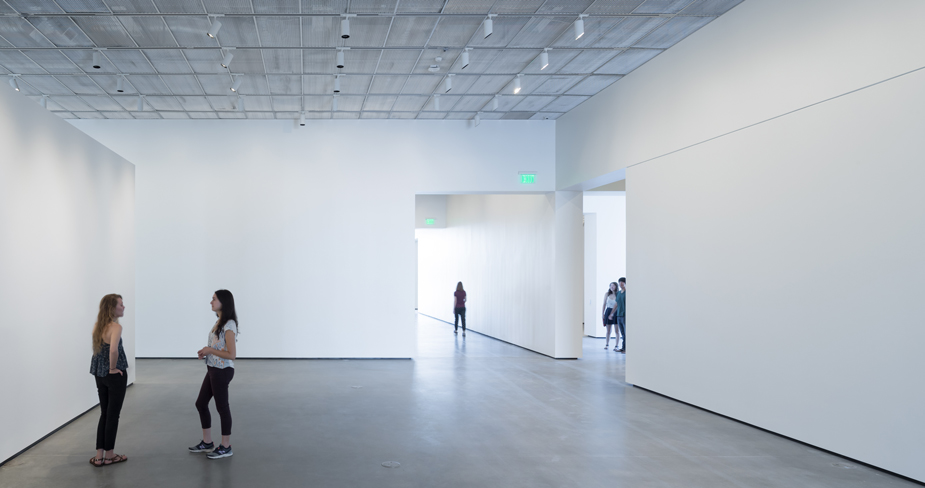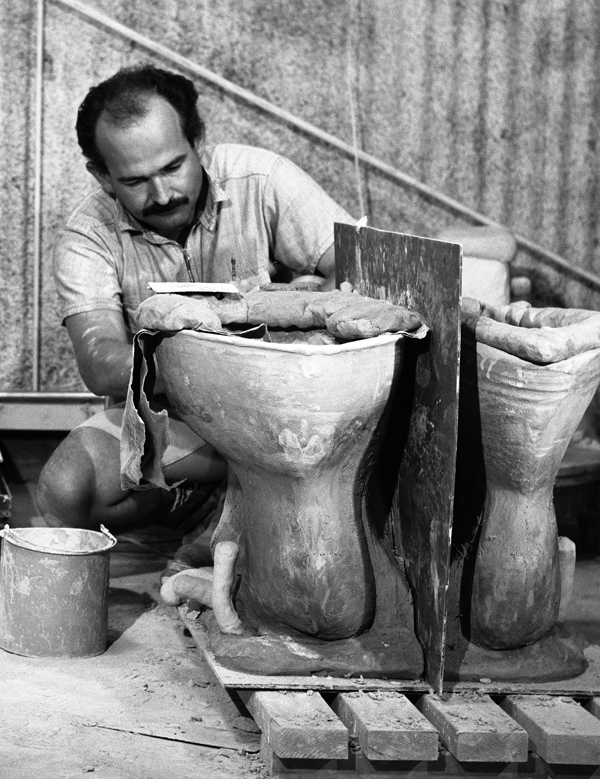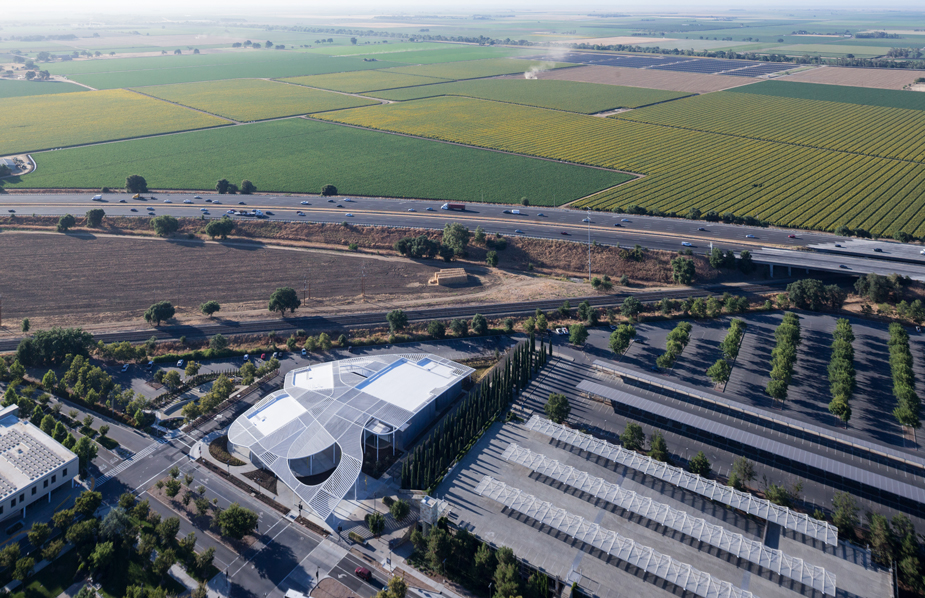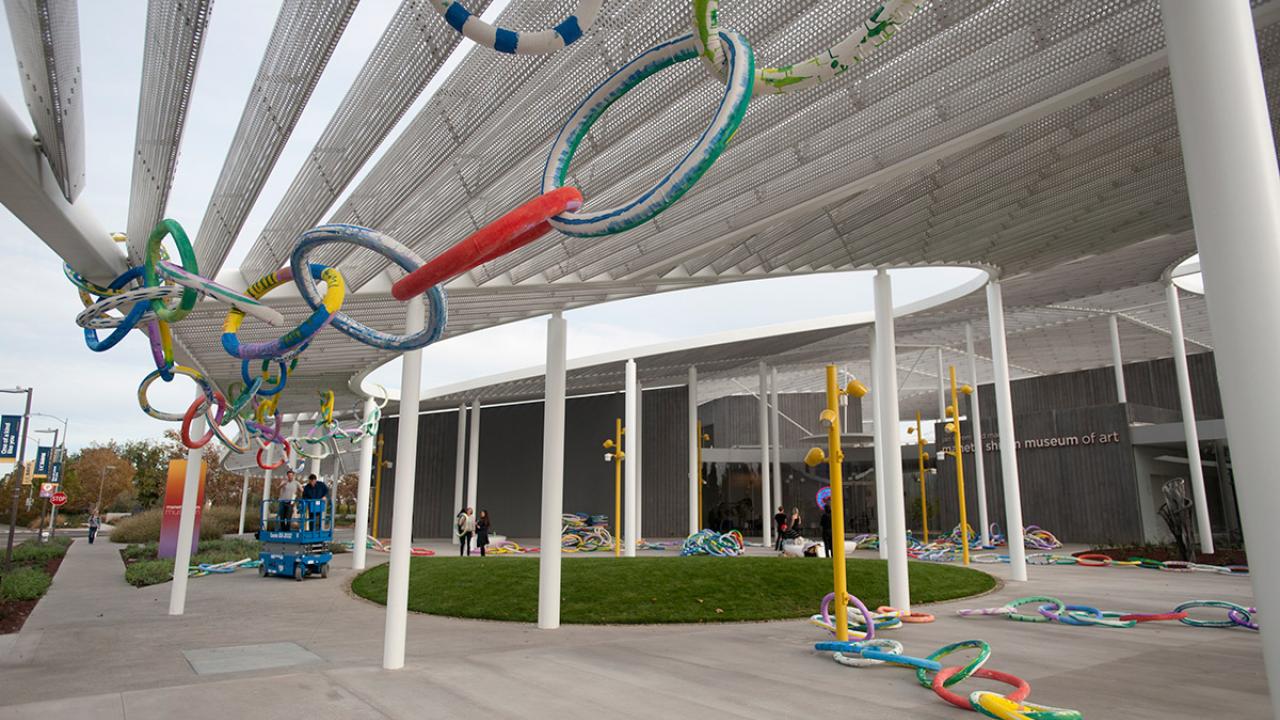AT A GLANCE
WHAT: Grand opening, Jan Shrem and Maria Manetti Shrem Museum of Art
WHEN: Sunday, Nov. 13
- Street fair — 10 a.m.-4 p.m.
- “Ribbon cutting” — noon
- Museum open — noon-5 p.m.
WHERE: Old Davis Road at the campus’s south entry. The Gateway Parking Structure and Visitor Parking Lot 1 are next door.
ADMISSION: Free to the street fair and museum. In fact, museum admission is free every day.
REGULAR HOURS:
- Tuesday, Wednesday and Friday — noon-6 p.m.
- Thursday — noon-10 p.m.
- Saturday and Sunday — 11 a.m.-5 p.m.
You’ve probably seen the outside of the Jan Shrem and Maria Manetti Shrem Museum with its Grand Canopy; now come see the inside and the treasures it holds.
Art treasures, of course.
But there are so many other treasures in the $30 million museum, which holds its grand opening this Sunday (Nov. 13). Consider:
- The treasure of space, indoors and out, interconnected and flexible, depending on exhibition needs.
- The treasure of an indoor-outdoor studio — the only one of its kind in a university art museum — where you can see art in the making and make your own art.
- The treasure of education, in a 125-seat hall, the Collections Classroom and study areas. A third of the museum is devoted to arts education.
- And in one of the inaugural exhibitions, the treasured history of the UC Davis art department, founded in 1958.
‘Art Wide Open’ and free
Admission is free — not just for the grand opening, but always. “Thanks to our Manetti Shrem Museum partners, we are free for all,” said Rachel Teagle, the museum’s founding director, in her introduction to the grand-opening program. “We believe art should be accessible and approachable to everyone who walks through our doors. No admission fee. Just great art.”

Sunday’s “Art Wide Open” celebration starts with a street fair at 10 a.m. on Alumni Lane, on the museum’s east side. See the museum's location on the campus map. The festivities will include performance art and other entertainment, plus screen printing and other activities, including the opportunity to decorate party hats in celebration of the birthdays of two of UC Davis’ art emeriti: Roland Petersen and Wayne Thiebaud. The fair, complete with food trucks, will run until 4 p.m.
UC Davis Staff Appreciation
The museum invites current and retired UC Davis staff members to an open house and reception, 3 to 6 p.m. Friday, Nov. 18.
The museum is collaborating with Sacramento’s Verge Center for the Arts on the street fair and the “ribbon cutting.” The ceremony starts at noon — but without a ribbon and without any cutting!
Instead, the ceremony will feature site-specific art by Lisa Rybovich Crallé, who received a Master of Fine Arts degree from UC Davis in 2011. She has created a 1,500-foot-long chain of 500 fabric-covered foam rings, painted by members of the community in four public events on campus and off, to hang from the Grand Canopy. She’ll add 200 gold-plated charms to turn the chain into “a gigantic charm bracelet for the building to wear,” and come Sunday, the chain will be unlinked rather than cut. See story and video about Crallé and her art.

A tribute and retrospective
The museum opens with four exhibitions, led by Out Our Way, exploring the development of the “revolutionary” art department (as described in the grand-opening program) and featuring works by the department’s first-generation faculty.
“Founding Chair Richard L. Nelson built his department as a ‘team of rivals,’ intentionally bringing together artists with differing opinions about aesthetics and teaching philosophy, while all shared an exceptional grasp of the properties of their materials. In this creative community, relentless experimentation prevailed.”
Petersen and Thiebaud are on the first-generation list, along with Robert Arneson, John Baxter, Roy De Forest, Jane Garritson, Tio Giambruni, Ruth Horsting, Ralph Johnson, Manuel Neri, Daniel Shapiro and William T. Wiley. Each of them while at UC Davis realized a “pivotal moment” in his or her career, the program continues. Arneson, for example, created his Johns series — 10 sculptures of toilets and urinals — in the 1960s. Out Our Way reunites all of the Johns for the first time since they were made. (Arneson, of course, would later make UC Davis’Eggheads.)
Opening Exhibitions
- Out Our Way — The legacy of the UC Davis Department of Art, showcasing works by the first-generation faculty. Through March 26.
- Hoof & Foot: A Field Study — Video installation by Bay Area artist Chris Sollars, highlighting the symbiotic relationship between animals and students at UC Davis. Through Feb. 19.
- A Pot for a Latch — Participatory sculptural installation by Pia Camil, inspired by the outdoor market booths of her native Mexico City, as well as indigenous gifting economies and modernist art and design. Through Feb. 19. You’re invited, on select days, to exchange your objects for others on display.
- SO–IL: Museum as Process — Artifacts that illustrate and interpret the process of creating the museum. Through July 30.
MORE TO EXPERIENCE:
- Wish Trees for Peace (1996–2016) — Yoko Ono
- Copper Cage and Rosemary Place (1994) — Sandra Shannonhouse
- Gong (1986) — William T. Wiley
As noted in a news release, the museum assembled Out Our Way from the collections of major museums and private collections nationwide as well as UC Davis’ permanent collection, gathering 240 paintings, sculptures, drawings and prints. “Characteristic of the majority is an instinctive embrace of the vernacular and the desire to ingeniously transform the stuff of daily life.”
Out Our Way revives the “spirit of defiant provincialism” that, in merely 10 years, propelled the department to be recognized as one of the most courageous and wildly inventive community of artists in the world, the program states.
Author, artist and art critic Peter Plagens, in an essay included in the program, attributes the art department’s evolution to “serendipity and secret sauce,” including Nelson’s “talent” for picking teacher-artists.
Plagens said the department eschewed “the syllabus-besotted mode” of teaching and proved to be “way ahead of the curve on artists’ drawing on other disciplines — and perhaps more important — turning to materials not usually common to art, in order to make their work.”
The department also demonstrated how the art world extended beyond the confines of artists’ ghettoes in big cities. Davis wasn't New York. It wasn't San Francisco. And that was a good thing.
“No pressure to keep in step with fashio, and no expectation that a big-time gallery show would be the kind of break for which artists in the main American art metropoli are always yearning,” Plagens wrote.

Engaging all forms of creativity
Building on the department’s legacy, the new museum stands out as a piece of art all by itself, and affords the same kind of artistic opportunity that UC Davis offered to its first-generation art faculty.
The campus had long envision a museum at the campus's south entry, as part of an arts corridor with the Mondavi Center for the Performing Arts. The road to museum construction began in late 2011 with a $10 million donation from Jan Shrem, founder of Clos Pegase winery in the Napa Valley, and his friend and fellow art patron, and now wife, Maria Manetti Shrem. They had been inspired by their friend, Margrit Mondavi, who jump-started the museum campaign with a $2 million donation in 2010.
Related Events
- Chancellor’s Colloquium: “Museum Building in Unpredictable Times” — With Florian Idenberg, a principal at SO–IL, part of the Manetti Shrem Museum’s architectural team. 4-5:30 p.m. Thursday, Dec. 8, Vanderhoef Studio Theatre, Mondavi Center for the Performing Arts. Please register here.
- “Peter Plagens at the Museum” — The author, artist and art critic will discuss “the secret sauce” that made UC Davis a center for artistic experimentation and innovation. 2:30-4 p.m. Sunday, Jan. 15, Community Education Room, Manetti Shrem Museum.
Associated architects SO–IL and Bohlin Cywinski Jackson won a public design-build competition that called for an edifice that engaged not only with UC Davis’ art legacy but also with the university’s deep connection to the land.
Thus you have the 50,000-square-foot Bill and Nancy Roe Grand Canopy, filtering light like the campus's tree canopy, and, owing to the way the 921 aluminum beams are laid out, resembling a patchwork of crops like those that stretch south from UC Davis.
The artistic opportunity in the museum's 19,000 square feet of exhibition and public spaces under the canopy extends to everyone. “At the Manetti Shrem Museum, education is out front and personal,” the grand-opening program states. “We welcome students of all ages to engage in an interdisciplinary approach to art, to cultivate individual creativity, and to gets hands on in the Carol and Gerry Parker Art Studio and Art Yard.”
The Paul LeBaron Thiebaud Collections Classroom provides direct access to world-class art, in display classes that line a wall behind the room’s large conference table. The art will rotate in and out of the university’s Fine Arts Collection.

Teagle said the museum’s dynamic program celebrates the best of the university’s innovative research and engages all forms of creativity, including everything from yoga in the galleries to a discussion about interspecies medicine.
In the words of Florian Idenburg, a founding principal of SO–IL, the Manetti Shrem Museum is “neither isolated nor exclusive, but open and permeable; not a static shrine, but a constantly evolving public event.”
Karen Nikos-Rose and Jeffrey Day contributed to this report. Nikos-Rose, associate director in the Office of Strategic Communications, is serving as the museum’s public information representative; and Day is a content strategist in the Division of Humanities, Arts and Cultural Studies, College of Letters and Science.
